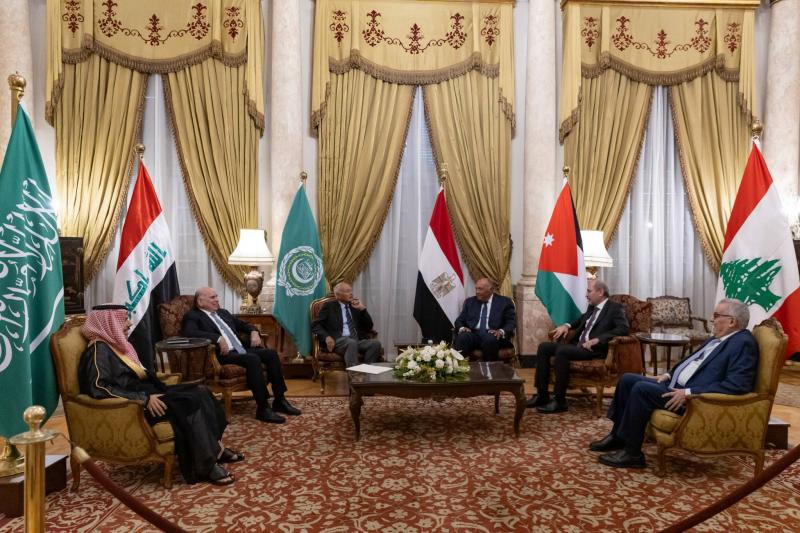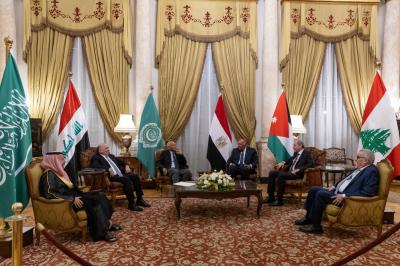The meeting of the Ministerial Contact Group on Syria confirmed that the only solution to the Syrian crisis is a political one. The attendees expressed their hope to resume work on the Syrian constitutional track and to hold the next meeting of the Syrian Constitutional Committee in Oman with the facilitation and coordination of the United Nations before the end of this year. They agreed on the importance of seriously completing this track as a key avenue towards resolving the crisis and achieving the desired political settlement and national reconciliation.
Participants welcomed the announcement by the United Nations and the Syrian government of an agreement reached on August 7, 2023, regarding the provision of humanitarian assistance through the "Bab al-Hawa" crossing for a period of six months. They also welcomed the Syrian government's decision to extend the opening of the "Bab al-Salama" and "al-Rai" crossings for humanitarian aid until November 13, 2023. The members of the contact group expressed their anticipation for continued assistance to those in need and encouraged the Syrian government to consider extending the use of these crossings for further periods in the interest of the Syrian people.
**Refugee Crisis**
The contact group and the Syrian Minister of Foreign Affairs emphasized the need to address the refugee crisis and its implications for the Syrian people and host countries. They highlighted the importance of enhancing cooperation between the Syrian government and host countries to organize and facilitate the voluntary and safe return of refugees, alleviating their suffering in coordination with relevant UN agencies, notably the UN High Commissioner for Refugees, as a priority to be worked on.
Participants also confirmed the need to intensify work with the international community and the UN to expedite the implementation of early recovery projects and expand humanitarian activities while building the necessary foundations for recovery. In this context, Syrian Foreign Minister Faisal al-Miqdad explained the measures and facilities undertaken by Syria and mentioned the ongoing dialogue and cooperation with the UN High Commissioner for Refugees, highlighting the facilitation provided by the Syrian government for the Commission to conduct its work in Syria. He affirmed that these measures would continue to be intensified, including facilitating the opening of more offices for the High Commissioner for Refugees in areas of refugee return and announcing regularly the procedures taken to facilitate the return of refugees, including their inclusion in presidential amnesty decrees. He also confirmed the continued regular announcements regarding the numbers of returning refugees and the Syrian government's commitment to maintaining constructive engagement with the Commission on refugee return matters, continuing cooperation between Syria and Jordan as outlined in the Amman statement and coordinating with UN agencies to achieve the return of the thousand refugees from Jordan.
The importance of the following was emphasized:
- Providing incentives and facilities for returning refugees and coordinating measures with host countries.
- Establishing a platform to register the names of refugees wishing to return in coordination with host countries and relevant UN agencies.
- The Syrian government providing information about the needs of areas that will witness the return of refugees.
Additionally, the committee stressed the need to intensify efforts to exchange kidnapped individuals and detainees and search for the missing in collaboration with international organizations like the International Committee of the Red Cross. In this context, the Syrian Foreign Minister affirmed that his country is committed to working on the release of all kidnapped Syrians and to regularly announce efforts in this regard, including providing information to their families and about their locations when available, as part of the Syrian government's national duty in this matter.
Participants welcomed the convening of the first meeting of the Jordanian-Syrian Joint Security Committee for border control and combating drug production and trafficking in July 2023. They also welcomed the joint cooperation between the governments of Iraq and Syria in the field of drug control through information exchange, which resulted in the dismantling of an international trafficking network operating in the region in August 2023 and preparations for the signing of a memorandum of understanding between the two countries in this regard. Participants expressed their desire to continue and intensify joint cooperation between Syria and regional countries to support efforts against drug production and trafficking, aiming to eliminate this growing threat.
Members of the Arab Ministerial Contact Group reiterated the necessity of supporting anti-terrorism efforts in Syria and called for intensified cooperation between the Syrian government, relevant countries, and the UN, urging the international community to play an active role in combating this threat in all its forms and rooting out all its sources. They reaffirmed support for Syria and its institutions in their legitimate efforts to maintain the country’s sovereignty and security, end the presence of armed and terrorist groups on Syrian territory, and withdraw all unlawful foreign forces, in accordance with international law and aligned with the UN Charter, in a manner that preserves Syria's security and that of the region.
Participants agreed to hold the next meeting of the contact group with the Minister of Foreign Affairs of the Syrian Arab Republic in Baghdad and to establish a contact team of experts for follow-up and preparation for the upcoming meeting.




